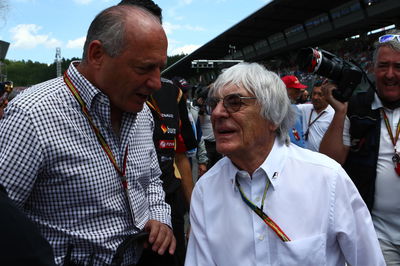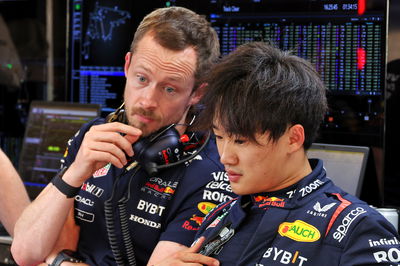Kate Walker: With liberty and justice for Bernie

The tale of the sword of Damocles has long been used to highlight the pitfalls of power, the fear that can only come from having - and being in a position to lose - it all.
For the past three years, Bernie's sword has been in the shape of a Munich courtroom, the only real bogeyman with the potential to cost the F1 boss his life's work. Whatever negative publicity the trial has attracted in the wider world, the past three years have seen no slackening of the reins when it comes to signing up new races or securing sport-wide sponsors like Emirates.
Instead the threat from Munich has been the internal threat, the potential of the court case to force CVC's hand and ensure Ecclestone's removal as top dog of the sport that he helped wrestle from amateurish amusement into globe-trotting financial behemoth. Were Bernie to lose, his position would be untenable, and his future more of the pipe and slippers variety than the wheels and deals.
Many 83-year-olds would be happy with the pipe and slippers, but Bernie Ecclestone is not most people. Instead, having negotiated a settlement that involves $100 million (?60m) and no concession of any guilt, the Briton exited the court and proceeded to describe himself as an idiot who shouldn't have settled as the prosecutors didn't have much of a case.
So why settle in a trial already scheduled to end in October, and which requires only two days' attendance per week, or around 20 more days in session? For a man with a private jet who travels the world on a regular basis, regular hops to Munich are hardly arduous. A younger defendant could do it on easyJet.
In Budapest there was chatter about increased board-level discussions - particularly at Daimler - concerning the viability of continuing involvement in a sport whose figurehead had spent three years in the headlines paired with the phrase 'bribery trial'. Ecclestone's standing in the courtroom may have been unimpeachable, but corporate boards are also wary of the court of public opinion.
By cutting his trial by roughly ten weeks at a personal cost of $100 million plus a king's ransom in legal fees - and by securing a settlement with no mention of guilt or culpability - Ecclestone has been able to put himself back in the fight to secure his F1 future. With no ongoing trial and no guilty verdict, boards can no longer point to Ecclestone's legal difficulties as a reason to either dial back their corporate involvement or press for a replacement.
Having already stepped down from the board of Delta Topco, Ecclestone has had a small taste of life without F1 firmly in his grip. A statement released in January, when the decision was taken, said the Briton would still "run the [F1] business on a day to day basis, but subject to increased monitoring and control by the board."
It is well-known that there is no one successor for Ecclestone, but as his bribery trial progressed mutterings surrounding the creation of a committee of three to replace him gathered apace. Budapest was remarkable for the divergent Bernie gossip doing the rounds: on the one hand, he had a get-out clause in Munich, and was sure to win although no one was yet sure how; on the other, much time was given over to guessing the identities of the future ruling triumvirate.
Bernie's bribery battles may be behind him, but there are interesting times ahead as the 83-year-old works to regain full control of a sport that has spent much of the past year working in the background to plan for a future without him.
By Kate Walker
Kate Walker is a senior F1 writer for Crash.net. A member of the F1 travelling circus since 2010, she keeps an eye on the behind the scenes wheeling and dealing that makes Formula One a political melodrama.











